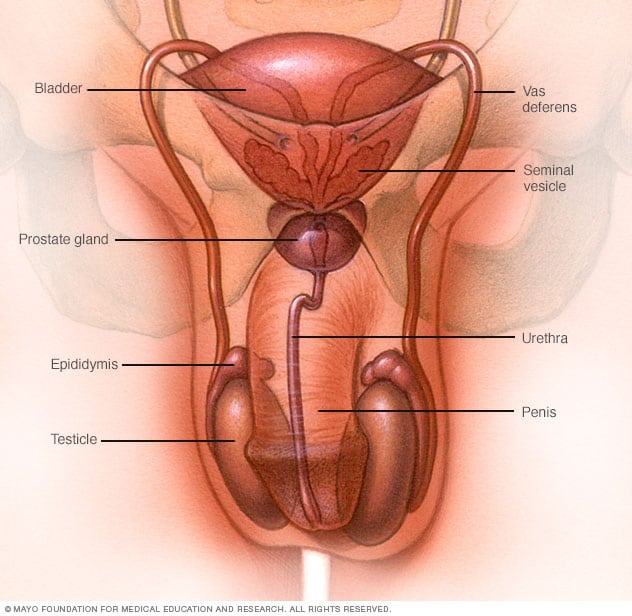orchitis
orchitis
overview
Orchitis (or-KIE-tis) is an inflammation of one or both testicles. Bacterial or viral infections can cause orchitis, or the cause may be unknown. Orchitis is most often the result of a bacterial infection, such as: B. a sexually transmitted infection (STI). In some cases, the mumps virus can cause orchitis.
Bacterial orchitis may be associated with epididymitis – an inflammation of the coiled tube (epididymis) at the back of the testicle that stores and transports sperm. In this case it is called epididymo-orchitis.
Orchitis causes pain and can affect fertility. Medications can treat the causes of bacterial orchitis and relieve some signs and symptoms of viral orchitis. However, it may take several weeks for scrotal tenderness to disappear.
Symptoms
Orchitis signs and symptoms usually develop suddenly and may include:
- Schwellung in einem oder beiden Hoden
- Schmerzen von leicht bis schwer
- Fieber
- Übelkeit und Erbrechen
- Allgemeines Unwohlsein (Unwohlsein)
The terms “testicle pain” and “groin pain” are sometimes used interchangeably. However, groin pain occurs in the fold of skin between the thigh and stomach - not in the testicle. The causes of groin pain are different from the causes of testicular pain.
When to go to the doctor?
If you have pain or swelling in your scrotum, especially if the pain comes on suddenly, see your doctor immediately.
A number of conditions can cause testicular pain, and some require immediate treatment. One of these conditions is twisting of the spermatic cord (testicular torsion), which can cause pain similar to orchitis. Your doctor may perform tests to determine which condition is causing your pain.
Causes
Male reproductive system

Male reproductive system
The male reproductive system produces, stores and moves sperm. Testicles produce sperm. Fluid from the seminal vesicles and prostate gland combines with sperm to form semen. The penis ejaculates semen during sexual intercourse.
Orchitis can be caused by a bacterial or viral infection. Sometimes a cause of orchitis cannot be determined.
Bacterial orchitis
Most commonly, bacterial orchitis is associated with or is the result of epididymitis. Epididymitis is usually caused by an infection of the urethra or bladder that spreads to the epididymis.
Often the cause of the infection is an STI. Other causes of infection may be related to being born with abnormalities in your urinary tract or having a catheter or medical instruments inserted into your penis.
Viral orchitis
The mumps virus usually causes viral orchitis. Nearly a third of men who become infected with mumps after puberty develop orchitis, usually four to seven days after the onset of mumps.
Risk factors
Risk factors for nonsexually transmitted orchitis include:
- Nicht gegen Mumps geimpft sein
- Wiederkehrende Harnwegsinfektionen haben
- Eine Operation, die die Genitalien oder die Harnwege betrifft
- Mit einer Anomalie in den Harnwegen geboren zu sein
Sexual behaviors that can lead to STIs put you at risk of sexually transmitted orchitis. These behaviors include:
- Mehrere Sexualpartner
- Sex mit einem Partner, der eine STI hat
- Sex ohne Kondom
- Eine persönliche Geschichte einer STI
Complications
Complications of orchitis can be:
- Hodenatrophie. Orchitis kann schließlich dazu führen, dass der betroffene Hoden schrumpft.
- Hodensackabszess. Das infizierte Gewebe füllt sich mit Eiter.
- Unfruchtbarkeit. Gelegentlich kann Orchitis zu Unfruchtbarkeit oder unzureichender Testosteronproduktion (Hypogonadismus) führen. Diese sind jedoch weniger wahrscheinlich, wenn die Orchitis nur einen Hoden betrifft.
prevention
Prevent orchitis:
- Lassen Sie sich gegen Mumps, die häufigste Ursache einer viralen Orchitis, impfen
- Praktizieren Sie Safer Sex, um sich vor STIs zu schützen, die eine bakterielle Orchitis verursachen können
Sources:
- Ferri FF. Orchitis. In: Ferri’s Clinical Advisor 2019. Philadelphia, Pa.: Elsevier; 2019. https://www.clinicalkey.com. Abgerufen am 29. September 2018.
- Fragen Sie MayoExpert. Skrotale Masse (Erwachsener). Rochester, Minnesota: Mayo Foundation for Medical Education and Research; 2017.
- Orchitis. Merck Manual Professional-Version. https://www.merckmanuals.com/professional/genitourinary-disorders/penile-and-scrotal-disorders/orchitis. Abgerufen am 29. September 2018.
- Zustand: Epididymitis/Orchitis. American Pediatric Surgical Association. https://www.eapsa.org/parents/conditions/ae/epididymitis-orchitis/. Abgerufen am 29. September 2018.
- Wein AJ, et al., Hrsg. Urologische Untersuchung des Kindes. In: Campbell-Walsh-Urologie. 11. Aufl. Philadelphia, Pennsylvania: Elsevier; 2016. https://www.clinicalkey.com. Abgerufen am 29. September 2018.

 Suche
Suche
 Mein Konto
Mein Konto